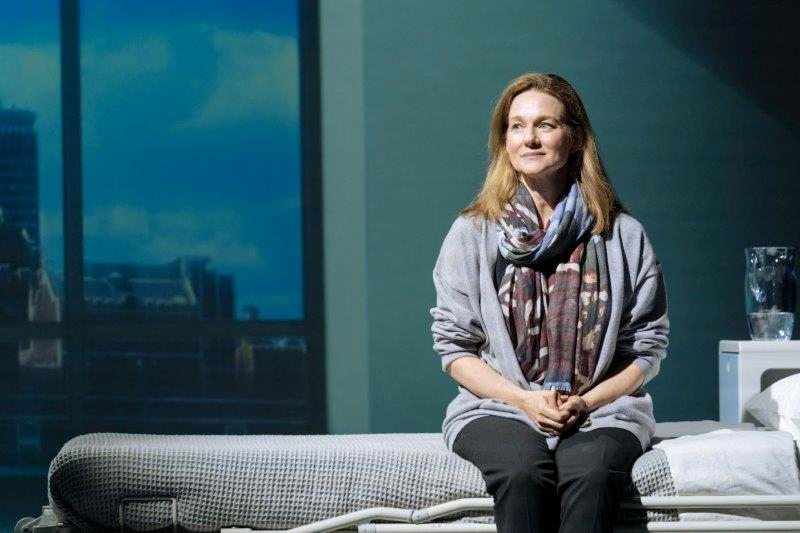07 June 2018
My Name is Lucy Barton
The Bridge Theatre
reviewed by Adam McCormack
Star rating: ****
 Turning a novel into a stage production is not easy. Nuances, thoughts and emotions that can be effectively expressed in prose are difficult to replicate in drama. This difficulty is enhanced further if the production is a monologue – leaving the performer devoid of anyone with whom to interact. That director Richard Eyre’s production of “My Name is Lucy Barton” is such a triumph is, then, mightily impressive. It works because of the emotional power of Elizabeth Strout’s short novel, Rona Munro’s adaptation, Eyre’s direction, and, most importantly, a mesmerising performance from Laura Linney.
Turning a novel into a stage production is not easy. Nuances, thoughts and emotions that can be effectively expressed in prose are difficult to replicate in drama. This difficulty is enhanced further if the production is a monologue – leaving the performer devoid of anyone with whom to interact. That director Richard Eyre’s production of “My Name is Lucy Barton” is such a triumph is, then, mightily impressive. It works because of the emotional power of Elizabeth Strout’s short novel, Rona Munro’s adaptation, Eyre’s direction, and, most importantly, a mesmerising performance from Laura Linney.
With a simple stage featuring a chair and a hospital bed, and a backdrop of photographs to signal changes of location, Lucy Barton recounts the story of her finding her true identity during a 9-week hospital stay (the malaise is not disclosed). Her husband has, he claims, a phobia of hospitals and initially sends in a friend to visit, but ultimately resorts to summoning Lucy’s estranged mother to come from rural Illinois to her New York hospital bedside. Via a series of vignettes, where Linney plays both her mother and Lucy, we learn of the difficulties of her childhood and the complex and troubled relationship she has with her parents. Lucy’s father was a German POW, deeply disturbed by his actions in the war and, as he brought his 3 children up in extreme rural poverty, this left Lucy with some deep emotional scars. The stories are at times amusing and whimsical, but also disturbing, as Lucy recalls long periods when she was locked in her father’s truck – once with a snake – and her father’s mistreatment of her gay brother. Lucy relates her escape to New York, and the characters she met as she began her career as a, ultimately very successful, writer. However, it is the interactions with a mother who failed to protect her from her father’s emotional turmoil that gives us real insight into her character and Lucy’s journey of self-discovery. A journey that reaches a point where she can say: “My Name is Lucy Barton”.
Elizabeth Strout has expressed hope that the audience will be sufficiently absorbed to, for the one and a half hours of the production, briefly experience someone else’s life. By this measure the play is extremely successful. The power of Linney’s performance, and her ability to relate to an audience, not only keeps everyone fully engaged, but also facilitates a high degree of empathy. Strout has also said that she hopes that the play will help people to understand a little more about themselves. I suspect that this was not the reason that many in the audience gave Laura Linney a standing ovation, but as people journeyed home, for some, that understanding may have emerged. To some extent, though, this is more a story of modern America. It incorporates the fears surrounding the Aids epidemic, as well as 9/11, but also shows that while someone can come from extreme poverty and cross class lines, the process can be difficult.


